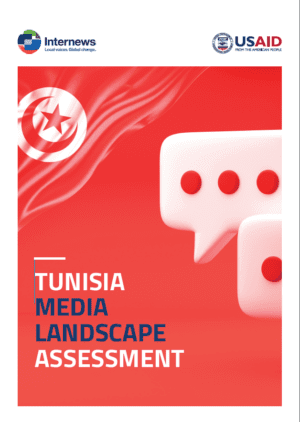Read the Report
Tunisia has undertaken significant strides towards its democratic transition in recent history, with freedom of expression and a vibrant media landscape being two of the main gains from the Jasmine revolution. However, almost a decade later, the levels of trust Tunisians have towards the electoral and political processes (EPP) in their country are on a downward trend. This lack of trust can be attributed to several factors, most notably that citizens believe elected officials and political parties are doing little to address their needs, paralleled with a media landscape, which despite being vibrant in volume, is in need of significant strengthening in capacity, credibility, relevance and reach.
The year 2021 commenced with civil unrest in several regions in Tunisia, which was triggered by a volatile political, social and economic climate. This instability was only made worse by growing divisions amongst political parties and state representatives, in addition to restrictive measures imposed by the government due to the Covid19- pandemic, with significant economic impact. Furthermore, these factors created an increased risk of spreading misinformation and disinformation to influence political and social discourse.
In response to the aforementioned challenges and to support Tunisia’s inclusive and effective democratic transition, USAID is implementing the five-year Tunisia Political Transitions Project (PTP). The PTP project is multifaceted and is designed to support key electoral bodies, governing institutions, civic groups and the media lay a foundation for increased public trust and inclusive participation in Tunisia’s democratic transition.
A key component of the PTP project, implemented by Internews, focuses on better informing and engaging Tunisian citizens, specifically vulnerable and underserved populations, in elections and political processes through strengthening Tunisia’s media landscape and the capacities of its information producers as well as raising the levels of awareness and media and information literacy amongst target groups. Internews will achieve the project’s objectives by adopting three main approaches:
Provide training and support for selected local, regional and national traditional and nontraditional media outlets and information producers to create credible, timely and engaging content which reflects the needs, concerns and voices of its communities.
Raise the levels of media and information literacy to address trust vulnerabilities particularly in rural populations and among women, youth and persons with disabilities and enable them to be critical thinkers and smarter information consumers, thus encourage deeper civic engagement.
Convene with a variety of stakeholders including political actors, CSOs, technology providers, journalists and the media to build a collective understanding of the root causes, sources and channels for the spread of misinformation and disinformation in Tunisia and design activities to combat them.
The preliminary phase, critical to the design of the projects programming and activities is conducting a media landscape assessment. The objective of this assessment is to map out and assess the capacities of the various information producers, develop a clear understanding of media consumption habits amongst information consumers and identify the strengths and weaknesses in the framework which governs the flow of information supply and demand. The key findings and recommendations from the media landscape assessment provide the blueprint for targeted, deliberate programming which sets sustainability and maximum impact as the driving forces for all proposed activities and interventions.
